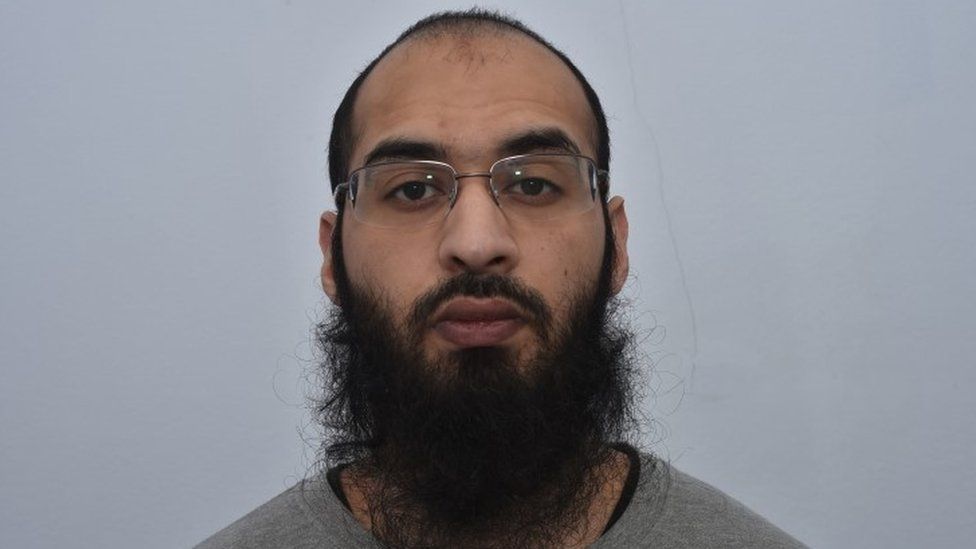Man who urged Prince George attack admits terror charges
- Published

Husnain Rashid faces a lengthy sentence, the judge has warned him
An Islamic State supporter who called for jihadis to attack Prince George has admitted a string of terror charges.
Husnain Rashid, 32, of Leonard Street in Nelson, Lancashire, brought his trial at Woolwich Crown Court to a halt with a dramatic change of plea.
Nearly two weeks into his trial Rashid was re-indicted and pleaded guilty to three counts of engaging in conduct in preparation of terrorist acts.
He also admitted one count of encouraging terrorism.
Rashid will be sentenced on 28 June at the same court for the offences spanning from October 2016 to April this year.
Husnain Rashid shared Prince George's photograph in tips for would-be attackers
Judge Andrew Lees told the defendant: "For the past week I have listened to the most disturbing allegations.
"You have admitted these allegations of encouraging others to commit terrorist activities and publishing statements to encourage the killing of others.
"It is inevitable that you will receive a very lengthy prison sentence and there will be a consideration of a life prison sentence."
He added: "The question of your future dangerousness and the protection of the public is a matter that I will have to give very careful consideration."
Football attack
On 13 October Rashid used a Telegram chat group to call on supporters to target the four-year-old Prince George who had started school at Thomas's Battersea in south-west London a month earlier.
Prosecutors said Rashid was encouraging terrorism by posting a photograph of the prince at the school super-imposed with silhouettes of two masked jihad fighters.
Last week, prosecutor Annabel Darlow told the court "the underlying message was clear" that "Prince George and other members of the royal family should be viewed as targets".
"Even the royal family will not be left alone," Rashid messaged the group, before sharing the school's full address and postcode.
He added: "School starts early."
A magazine he was producing contained suggestions to strike the 2018 World Cup in Russia using vehicles, weapons or bombs.
He also posted suggestions of which British football stadiums terrorists could strike following a deadly attack outside Besiktas's ground in Turkey, his trial heard.
He ran a "prolific" Telegram channel named the Lone Mujahid where he provided an "e-toolkit for terrorism", the prosecution said.
This allegedly included a recipe for the poison ricin and instructions for making petrol bombs and napalm.
His list of targets included British Army bases, shopping centres, Jewish communities and government buildings.
He also plotted with a British terrorist in Syria to bring down an aircraft with lasers, the court heard.
'Treasure trove'
Rashid posted a photograph of the Burmese ambassador to the UK, saying: "You know what to do."
He urged others to "fight and spill the blood to the apes in your land" and called for others to "start preparing tools and weapons/explosives".
Ms Darlow said on the first day of the trial: "His proposals were indiscriminate and made no distinction between adult and child, between members of fighting forces and civilians."
When police swooped on his house in November, Rashid "hurled" a phone containing a "treasure trove" of evidence over a wall into an alleyway.
Two charges of dissemination of a terrorist publication and one of failing to comply with a notice under the Regulation of Investigatory Powers Act will lie on file.
- Published23 May 2018
- Published30 April 2018